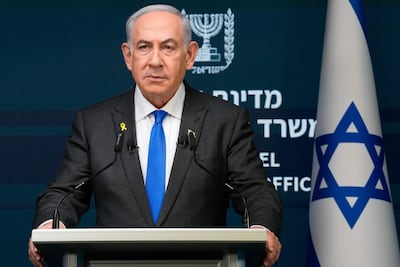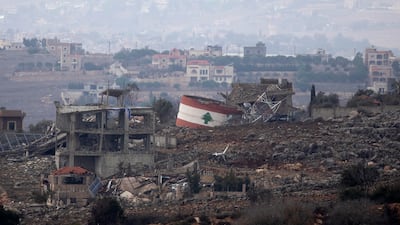It may appear to the rest of the world that Israel has scored a decisive victory in its 42-year conflict with Hezbollah.
It has killed many of its top leaders, intercepted most of its projectiles launched at Israeli targets, and severely degraded the group’s military capabilities after two months of fighting. This outcome will also lead to the creation a buffer zone between the Litani River and the Lebanese-Israeli border.
And yet, by simply surviving, Hezbollah may have achieved a longer-term victory. And so, for the Israeli public, upset that Prime Minister Benjamin Netanyahu failed to eradicate the group, the ceasefire amounts to a defeat.
Both Israel and Hezbollah once had an aura of invincibility. Neither possesses this after the fighting. The Israeli onslaught may have killed hundreds of Hezbollah fighters and commanders. Yet it also killed numerous Lebanese civilians. That is a strategic loss, creating a generation of Lebanese seething with anger.
The past two months of fighting were just the latest round of a conflict that spans four decades. Given how long the conflict has endured, the latest ceasefire is a temporary cessation that is unlikely to resolve any of the structural issues that have fuelled it in the first place.
The first issue is Lebanon’s insecurity as a result of Israel’s failure to resolve its conflict with the Palestinians. Only the resolution of this conflict will bring lasting peace to the Eastern Mediterranean.
Israel’s invasion of Lebanon in 1978 and 1982 aimed to expel the Palestine Liberation Organisation from its northern borders. It achieved a tactical victory, eliminating the PLO’s presence in the area in 1982, only to witness Hezbollah emerging in its place. Israel thought it could repeat its victory with the PLO. However, while the PLO withdrew to Tunisia, Hezbollah is a product of southern Lebanon. It is a local Lebanese movement, despite its support from Iran.
That 1982 invasion created the second structural issue. Israel fostered the conditions in Lebanon that spawned Hezbollah, a powerful militia that evolved into the country’s dominant political group. Once it became embedded in the structure of Lebanon’s admittedly weakened state, Hezbollah would never give up on its status.
In 1982, Israeli forces made the mistake of occupying southern Lebanon. This is what gave Hezbollah legitimacy among the local populace. The group’s relentless assaults eventually drove Israel from Lebanon in 2000, Israel’s first loss to an Arab military force.
In 2006, a month-long war broke out between the two sides, which ended in a standstill. Lebanon incurred heavy damages, and it was enough of a deterrent for Hezbollah to cease major military operations against Israel, until last year.

After the Hamas-led attack on Israel on October 7 last year, Hezbollah began launching rockets into Israel in an act of solidarity with the Palestinians. This tactic forced Israel to keep some military forces in northern Lebanon, while evacuating Israeli civilians.
In September, Israel responded with a series of deadly pager and walkie-talkie explosions, air raids against targets it says were linked to Hezbollah, and a series of assassinations – including air raids that killed its leaders Hassan Nasrallah and Fouad Shukr – bringing its future in doubt.
However, the third factor that precludes long-term peace is the inter-generational trauma and a desire for vengeance among many young Lebanese that this war has surely wrought.
If such feelings are not addressed properly and adequately, they could end up fuelling Hezbollah’s resurgence, or the rise of another group, which would in turn sustain the resentment that deprives the Middle East of what it most needs: security.
The ceasefire is a mechanism by which its enforcers will attempt to achieve sustainable security. The current agreement is the result of both the US and France pushing for the implementation of UN Security Council Resolution 1701, which would empower the Lebanese army and UN peacekeepers to monitor the area on the border with Israel, creating a buffer zone.
And yet this is a Pyrrhic victory for Israel and a tragic loss for the Palestinians in Gaza, despite the distance.
While most of Hezbollah’s missiles were intercepted, its October 13 strike on the Golan Heights, 65km south of the border, killed four Israeli soldiers. In other words, a buffer zone does not stop these projectiles from entering Israel. It only gives Israel a bit more distance and warning to intercept them. This is precisely why so many Israelis were upset about the deal this week.
At the same time, the fact that the US could sponsor a ceasefire after just two months of fighting in Lebanon sends a tragic message to the Palestinians in Gaza. Indeed, Israel declared that the end of fighting against Hezbollah gives it a chance to move more military forces to deal with Hamas, demonstrating that a war that has lasted more than a year failed to eradicate it.
The ultimate message that US President Joe Biden has effectively sent to the rest of the world, as his term in office ends in January, is that he could have restrained Israel in Gaza much earlier. That he chose not to underscores the first structural issue that is the core reason for the fighting in Lebanon: the unresolved fate of the Palestinian nation.


